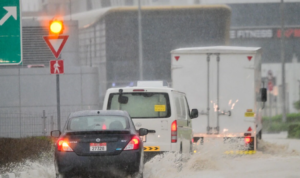Cloud Seeding: Harnessing Innovation to Navigate Desert Rain Deluges
Dubai, famed for its dry weather and scorching heat, faced heavy rainfall on Tuesday, leading to extensive flooding across the desert state. The unexpected deluge disrupted the city’s usual rhythm and raised concerns about the growing impact of climate change on extreme weather events in the region.
In the United Arab Emirates (UAE), yearly rainfall typically falls below 200 millimeters. With summer temperatures reaching up to 50 degrees Celsius, the country’s water reserves are strained, exacerbated by its heavy dependence on groundwater.
Addressing this urgent challenge, the UAE has spearheaded inventive approaches, including the creation of artificial rain through cloud seeding—a method of weather manipulation designed to boost precipitation. But what exactly does this entail?
Cloud seeding is a method that entails introducing “seeding agents” into clouds to prompt the condensation process and induce rainfall. The process commences with meteorologists at the NCM (National Center of Meteorology) monitoring atmospheric conditions and pinpointing suitable clouds for seeding, guided by precipitation trends. The Rain Enhancement Program (UAEREP) of the UAE, overseen by the Emirates’ National Centre of Meteorology (NCM), leads the initiative.
The UAE’s Integrated Approach to Weather Modification and Monitoring
Scientists leading this program concentrated on studying the atmospheric attributes of the UAE, particularly aerosols and pollutants, and their impact on cloud formation. The objective was to pinpoint a viable agent capable of enhancing cloud growth and, consequently, boosting rainfall.
After identifying suitable clouds, dedicated aircraft fitted with hygroscopic flares are deployed. These flares, affixed to the wings of the aircraft, contain salt-based components. Once reaching the designated clouds, the flares are activated, dispersing the seeding agent into the cloud. The salt particles act as nuclei, prompting water droplets to condense around them. Over time, these droplets accumulate and become heavy enough to precipitate as rainfall.

According to the UAEREP’s description of the process, the NCM has established a nationwide network consisting of 86 automatic weather stations (AWOS) to monitor weather conditions, six weather radars covering the entirety of the UAE, and one upper air station. Additionally, the Centre has developed climate databases and contributed to the advancement of high-precision Numerical Weather Predictions and simulation software in the UAE.
UAE’s Cloud Seeding: Innovating Safely Amid Environmental Concerns
Presently, the NCM operates four Beechcraft King Air C90 aircraft from Al Ain Airport, equipped with cutting-edge technologies and devices utilized for cloud seeding and atmospheric research. While cloud seeding holds potential benefits, concerns regarding its environmental impact and the safety of the seeding agents persist. In response, the NCM has implemented measures to ensure the safety and sustainability of its operations.
In contrast to cloud seeding programs in other countries that utilize silver iodide, a material with environmental implications, the UAE’s program avoids such chemicals. Instead, it opts for natural salts as seeding agents. The NCM has devised its own seeding agent called nano material, composed of fine salt coated with titanium oxide. Currently undergoing trials and testing, this material aims to evaluate its efficacy in augmenting precipitation.
Additional concerns have arisen regarding the potential consequences of altering natural processes. Given the region’s susceptibility to extreme weather events like storms and heavy rainfall leading to unprecedented floods, some caution against interfering with natural dynamics, suggesting that floods may be nature’s response to such interventions.










